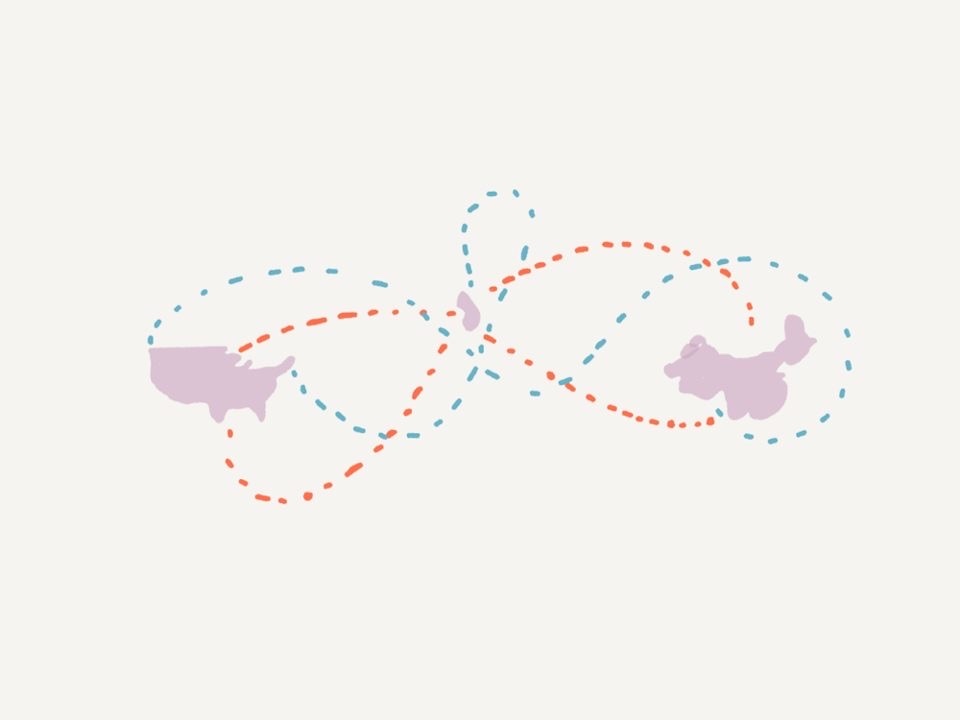A confession of a third culture kid
September 25, 2020
 Aadhya Ramineni
Aadhya RamineniDuring the first month at Bowdoin, the most common question everybody asked me was “Where are you from?” I think I just gave up at a certain point (maybe starting this semester) and gave them what they wanted to hear—“I’m Chinese American.” To be honest, I don’t even think I answered their question, but it was enough. To some extent, that was not too far from the truth, but really far from who I am.
When I was growing up in Shanghai, I always identified myself as an American. Although I never lived in this country until I came to Bowdoin, I spent multiple summers at summer camps in California, and I felt really strongly about this part of my identity—whatever that may have meant. From my American passport that gives me the privilege to skip most visa applications, to the education I have been able to and continue to receive, to the “American accent” I had growing up, I was technically an American/Chinese-American on paper. But more importantly, I think I chose to hide my Chinese side. Was it because being American was cooler at that age? Or was it because being Chinese was lame? Maybe a bit of both. This was hard to admit to myself until only a few years ago.
At 13, my family and I decided to finish my secondary education and begin my GCSEs and sixth form in the U.K., where I spent the next five years in Bath and Wales. Looking back, I think this was the beginning of my revelation, or, to put it more bluntly, being confused as hell. I started to realize what I thought was “cool” about me was actually lame and what I thought was “lame” was not so lame. The general stereotype is that Americans are loud, obnoxious and uncultured (the one other REAL American kid did kind of fit that description). Given this and being surrounded by white Brits, I felt my Chinese side being pushed into the light. I started embracing that side of me, but only by bits I knew were accepted. I don’t think I realized or wanted to acknowledge this at the time because of my personal prejudices and the reality in Shanghai. At that age, I just wanted to fit in.
But that all changed when I went to a truly magical, euphoric and transformative place: United World College Atlantic College (UWC AC). There were people from all corners of the world making “education a force to unite people, nations and cultures for peace and a sustainable future.” People were so authentically themselves, always generously with sharing their thoughts and culture with me. But most importantly, I did not have to label or categorize my identity. I did not need to fixate on whether I’m American or Chinese. It was a shabby town in Wales where I felt a true sense of belonging for the first time. Strangers turned into friends. Friends turned into family. It was utopia.
The transition from Wales to Maine was not easy, and it still isn’t. In Wales, I accepted my identity for whatever it was. But being back in the United States is starting to make me question things again. But what does it even mean to be American? I don’t know, but I definitely know that I’m not. I don’t know what “Hamilton” is, I don’t own anything from L.L. Bean, I don’t understand your sports culture, I don’t have a summer home or belong to a yacht club on the East Coast and I don’t like your Annie’s Mac and Cheese. And the longer I stay in the United States, the more I realize I do not belong to the category of Chinese American because I did not face the kind of struggles “yellow people” face growing up in the United States. Oh yeah, and I am most definitely NOT British. As a result, my Chinese friends saw me as American or perhaps white-washed, but Americans saw me as Chinese or Chinese American. Little things are put under a magnifying glass, but that’s what counts. More than ever, I feel out of place—not in a bad way, just really different from everybody else here. It’s funny how America is known as a “melting pot,” because it certainly did not accept me for who I am. The lack of understanding, curiosity and meaningful connection is disappointing, but at the end of the day, am I surprised?
Fortunately, I have found people—American or otherwise—that I can rely on. They were there for me during my transition in my first year, challenging me to be open-minded (something that I have come to realize I am not so good at) and catching me before I fall and make a mistake. Something that stuck with me was what a friend said: “Always give people the benefit of the doubt.” They helped me realize that America isn’t that f-ed up at the end of the day.
I never thought so much about my own identity before coming to Maine, and this feeling is as foreign as I feel. Shanghai is where my home is, Europe is where my family is and the United States is just a part of me that has its good and its bad.
Also, not gonna lie, I am pretty sure I barely made it into this category. There are so many other people out there who truly represent a third culture kid. But then look at all these Americans claiming cultures that do not belong to them: “I am 50% Italian, 25% British and 25% Irish, but my great-grandfather was from Asgard but he met my grandmother in Willy Wonka’s chocolate factory!” So maybe I’m not overstepping here.
Sophia Wei is a member of the Class of 2023.

Comments
Before submitting a comment, please review our comment policy. Some key points from the policy: